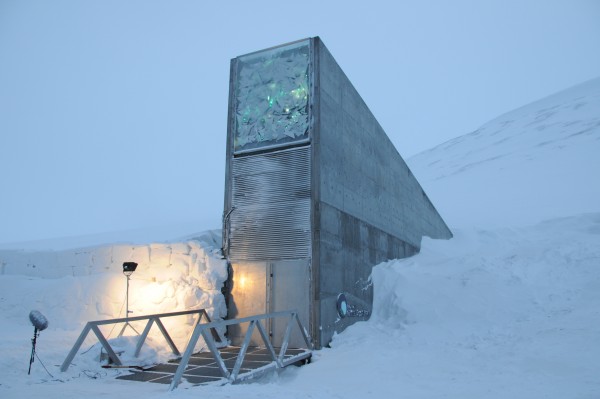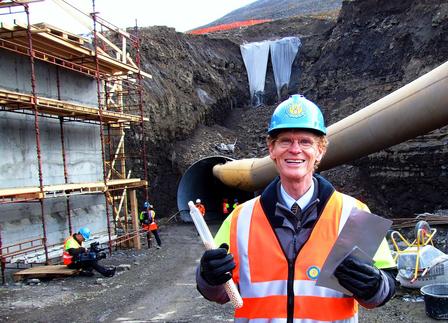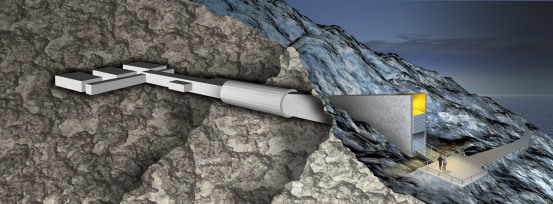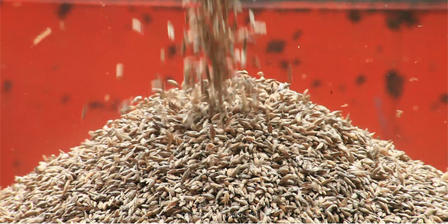"Seeds of Time" Trailer from Hungry, Inc. on Vimeo.
Have you heard of the Svalbard Global Seed Vault – sometimes called the Doomsday Vault – a seed bank on the Norwegian island of Spitsbergen, only 810 miles (about 1,300 kilometers) from the North Pole? Cary Fowler spearheaded its groundbreaking in 2006, and he remains the seed bank’s prime mover. Now a new film – due to open on May 22, 2015 at Cinema Village in New York City, and in Los Angeles and other top markets shortly afterwards – tracks the passion for saving a global diversity of seeds that has occupied Fowler for three decades.
The film, which debuted at the SXSW Film Festival in Austin last year, most recently screened at the Berlin International Film Festival in February. It follows Fowler’s effort to save a wide diversity of seeds, which Fowler and many others consider to be among Earth’s most precious resources. Fowler has said:
The fate of humankind is resting on these genetic resources … seeds.
The mission of the Svalbard Global Seed Vault is to provide a safety net against accidental loss of diversity in traditional genebanks.
While the media often mentions the seed bank in the context of a major regional or global catastrophe, Fowler has said its greatest use will occur when genebanks lose samples due to mismanagement, accident, equipment failures, funding cuts, and natural disasters.


Sandy McLeod, an Academy Award nominated independent filmmaker, both produces and directs the film. She said:
When I met Cary Fowler a whole new world opened up to me. I realized that, although I thought I knew a thing or two about food, the issues that he was grappling with were entirely new to me. And that those issues, largely concerning food security, are issues that anyone who likes to eat should not only know about, but also have a say in too.
Cary Fowler is a guy who has almost single-handedly created something of great value for the global community. I can’t think of any other global endeavors that have the kind of absolute value for all of us that the Svalbard Global Seed Vault holds.
Our food system is not sustainable or secure and this is a problem that affects us all. Without a good agricultural foundation we can’t have sustainable agriculture and without sustainable agriculture, we will not have a sustainable future.
According to a statement from the movie’s distributor, Kino Lorber:
10,000 years ago the biggest revolution in human history occurred: we became agrarians. We ceased hunting and gathering and began to farm, breeding and domesticating plants.
As the production of high yielding, uniform varieties has increased, diversity has declined. We are confronted with the global pressures of feeding a growing population, in a time when staple crops face new threats from disease and changing climates.
Crop diversity pioneer Cary Fowler travels the world, educating the public about the dire consequences of our inaction. Along with his team at The Global Crop Diversity Trust in Rome, Cary struggles to re-invent a global food system so that it can, in his words ‘last forever.’
With a passion few possess, Cary set out to build the world’s first global seed vault – a seed collection on a scale larger than any other. How can we best maintain the diversity that still exists for our food crops? How do we create new diversity to adapt our fields to a changing climate? The answers are as complex as the system they intend to fix. And it will require a combination of efforts: from scientists, plant breeders, researchers, farmers, politicians, and even gardeners.

Bottom line: A new feature-length documentary film tracks the history and mission of the Svalbard Global Seed Vault – sometimes called the Doomsday Vault – and its founder Cary Fowler. The film is due to open on May 22, 2015 at Cinema Village in New York City.












